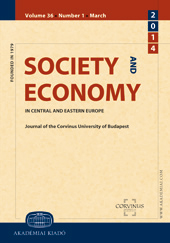Foreign direct investment and external debt in Hungary.
An attempt to examine the macroeconomic capital structure from a new perspective
Foreign direct investment and external debt in Hungary.
An attempt to examine the macroeconomic capital structure from a new perspective
Author(s): Iván Bélyácz, MÓNIKA KUTISubject(s): National Economy, Supranational / Global Economy
Published by: Akadémiai Kiadó
Keywords: foreign direct investment; external debt; macro-capital structure;
Summary/Abstract: This article comprises an examination of the basic macroeconomic capital structure from a corporate stand-point — based on capital structure theories and on an analytical framework of corporate finance. The ‘Trade-off Theory’ employed at the macro-level can be compared to the choice between the consumption-smoothing effect of external debt and the risk of bankruptcy, whilst the ‘Hierarchy Theory’ can be applied to the ‘pecking order’ of global capital flows. The ‘Free Cash Flow Theory’ emphasises the disciplining effect of external debt, significance of which has become more evident with the credit crisis and the IMF’s loan-package to Hungary. The macroeconomic capital structure shows that in respect to international investment, the debt-to-GDP ratio has been growing more rapidly over the last ten years, and due to the level of indebtedness, the conditions essential for sustainable development cannot survive. The authors attempt to show that this is the reason why an unbridgeable efficiency gap has appeared in the employment of external capital. Although domestic economic policy-makers are sure of their long-term ability to manage the ever-increasing external debt, it would be a mistake to overlook those macroeconomic anomalies which have brought about the widening of the efficiency gap.
Journal: Society and Economy. In Central and Eastern Europe ǀ Journal of the Corvinus University of Budapest
- Issue Year: 31/2009
- Issue No: 2
- Page Range: 211-234
- Page Count: 24
- Language: English

